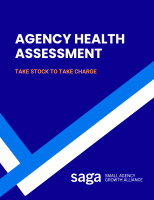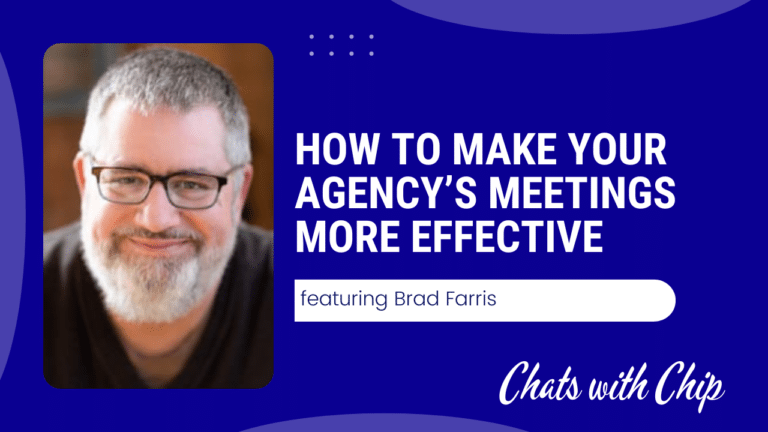No business owner wants to spend any more time than absolutely necessary dealing with legal and accounting matters.
Who wouldn’t rather think about creative solutions to client problems and that next great business opportunity?
Even though they may not be fun, these seemingly mundane matters shouldn’t be ignored.
Yet I have heard from a number of agency owners recently that they don’t like client contracts so they don’t have them.
That’s a mistake.
The arguments I have heard against contracts vary, but often include some variation on the following:
- Clients shouldn’t be locked in to working with an agency if they don’t believe it is working.
- Contracts slow down the business development process and hinder closing deals.
- I want to do business with clients who I can trust with a handshake agreement.
- I would never sue a client over a breached contract anyway, so why bother?
There are others, but you get the idea.
For those that doubt, here are some reasons why you ought to have contracts with all of your clients.
Good contracts solve future problems
A well-crafted agreement between two parties helps them to resolve issues that may arise during the relationship.
While contracts are often thought of as potentially divisive — saying this is party A’s responsibility and that is party B’s — they actually have the potential to aid in smoothing over issues by providing a roadmap.
Any legal document should be viewed not in the light of the start of a relationship when everyone is happy and excited, but rather with an eye toward how it would be seen if the relationship sours.
It should consider the possible downside risks for both parties and provide a way to address them reasonably and rationally.
A little bit of time invested at the start of the agency-client relationship can help preserve the partnership in the future.
Good contracts improve profitability
Do you ever worry about scope creep?
If not, please drop me a line because you likely have the most unique agency I have ever seen.
The fact is that clients — often unintentionally — seek to have an agency do more work than was envisioned originally without paying more.
It’s natural. And most agencies end up going beyond that initial scope more often than they care to admit.
When account managers and clients get together to work on projects and solve problems, they usually don’t think back to the initial discussions to figure out what was requested and promised.
In fact, often those who are doing the day-to-day work aren’t the same ones who set the terms of the relationship.
A well-drafted contract provides a roadmap for agency leaders to use to keep projects within scope.
And we all know that keeping client projects within scope is critical to maintaining profitability for your agency business.
Good contracts avoid misunderstandings
Have you ever had a conversation with somebody that the two of you later recalled differently?
We all have had that happen.
When it happens with a client, it can lead to costly outcomes.
Putting the terms of your deal in writing helps to ensure that everyone is on the same page.
I like handshakes as much as the next guy and share the (often misplaced) nostalgia for the “good ol’ days,” but there’s no record of handshakes.
The other problem with oral agreements is that it’s human nature to hear what we want to hear.
Though neither side may be intentionally misconstruing the agreement or attempting to gain an advantage, it’s natural to view things in the most favorable light.
Contracts allow both sides to reach a definitive agreement on the scope, payment terms, and other critical details.
Written agreements may not prevent all disputes, but they often can help to short-circuit the worst misunderstandings.
Good contracts make breaking up easier
You can count me among those who don’t want clients to be locked in to a relationship they don’t feel is working.
Nothing good ever comes from it.
If two parties no longer want to work together, they shouldn’t have to.
Rather than impeding this mindset, as many agency owners believe, contracts actually make it easier to end the business relationship.
That’s because the contract should lay out the process that both sides have to end the relationship.
I highlight “both sides” because agencies need to have the ability to fire clients, just as clients can choose to fire the agency.
If there is a well-defined process for ending an agreement, including minimum notice requirements and an explanation of how pending project fees and expenses are handled, it provides an orderly approach to moving in a new direction.
Without it, the agency and client need to work together to sort out those details at a time when both sides likely are unhappy and that isn’t a scenario suited to good outcomes.
Good contracts protect you from rogue clients
Most clients are well-behaved. Even those that may have disagreements with the agency or those that may be disagreeable to work with from time to time.
But we also live in the real world and there are those rare clients who are far more trouble than they are worth.
Many agencies will encounter clients at some point that engage in bad behavior like:
- Refusing to pay fees that are legitimately owed
- Demanding work beyond the initial scope without additional compensation
- Attempting to retroactively change terms or terminate an agreement without notice
- Threatening to use legal processes without actual merit
These instances may be rare, but putting a solid contract in place in advance limits the agency’s downside risk and provides leverage to find a fair resolution.
Good contracts help you sell your agency
Many agency owners envision a day when they can sell their business, hang up their laptops, and enjoy a leisurely retirement.
Whether that’s your own vision or you just want to keep your options open for a potential future merger or acquisition, you would be wise to have client contracts in place.
Any good due diligence process that you go through as part of such a deal will start with a request for all client contracts.
Saying “we don’t have any contracts” will be a major red flag for most M&A partners and could lead to the deal being derailed before it even gets out of the station.
Even if you don’t think you will ever want to sell or merge your agency, life and business have a way of presenting unexpected opportunities and challenges.
Why not keep the door open?











